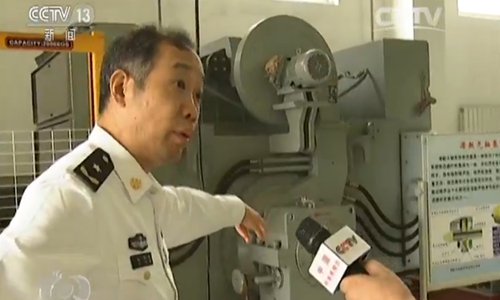HOME >> CHINA
Naval tech professor becomes full CPC central committee member
Source:Globaltimes.cn Published: 2019/11/1 2:45:13

Ma Weiming, an academician with the Chinese Academy of Engineering and professor at the Naval University of Engineering, introduces his invention for nuclear-powered submarines.Photo: Screenshot of CCTV 13
Ma Weiming, the Chinese academician, known for his cutting edge work on naval technology including electromagnetic catapult, railgun, and full electric propulsion, and who also said Chinese technology was more advanced than the US, has officially become a member of Communist Party of China (CPC) Central Committee.
Ma's promotion from alternate member to full member fills a vacancy per the Party Constitution, according to a communique released following the fourth plenary session of the 19th Central Committee of the CPC that concluded in Beijing on Thursday.
With long-term commitment in electromagnetic science, Ma, a professor at the Chinese Academy of Engineering and the Naval University of Engineering in Central China's Hubei Province, and also vice president of China Association for Science and Technology (CAST), guided his research team where they made revolutionary and original discoveries in the field of integrated ship power, electromagnetic emissions, and access to new energy technologies, according to his profile on the CAST website.
As the head developer of the Chinese electromagnetic catapult, Ma said the technology was just as good as anything the US used. Ma and his team have completed multiple successful tests on the catapult, and assisted with takeoff technology in 2018, China Military Online reported.
Considered the most advanced aircraft carrier launch method, the electromagnetic catapult is more efficient than traditional steam catapults. China's two aircraft carriers do not use a catapult.
Military observers said Ma's electromagnetic catapult can be used on China's third carrier, which would make it the second type of carrier in the world featuring the advanced technology, behind the US' Ford-class.
Because of Ma's efforts, China became the first country to install an electromagnetic railgun on a warship.
Several sea trials were conducted with a landing ship equipped the weapon, according to reports over the past two years from Beijing-based Science and Technology Daily and China Central Television (CCTV).
The railgun fires projectiles using electromagnetic force with increased destructive velocity. It can travel at longer ranges compared with standard artillery and offers greater accuracy, military experts said.
While the US has experimented with similar concepts, reports said China will outpace it and equip the weapon on a modified version of Type 055 destroyer.
Ma has also played a pioneering role in China's submarine program.
While discussing one of his inventions on a nuclear-powered submarine featured on CCTV in 2017, Ma said, "This is our team's first advanced project in the world. And by advanced, I mean more advanced than the US."
Ma's team also developed the concept of medium-voltage direct current full electric propulsion (FEP) technology, another world-first achieved in 2003, while other countries such as the US and UK were using alternating current technology, according to a statement on the Hubei government website.
Also known as integrated ship power, FEP enables vessels to allocate power whenever necessary, while traditional vessels use power designated for propulsion even though ships rarely sail at full speed. This leaves a considerable amount of power unused, military observers said, noting that Western technology is too complicated while the Chinese method, although more challenging, provides greater stability.
"The essential goal of FEP on a warship is to enable high-energy weapon operation," Ma said. This might include lasers and railguns, analysts also said.
Two Chinese scientists that Ma mentored, Xiao Fei and Wang Dong, received first-class merit citations, rare awards given during peacetime, in 2018 and 2019 respectively, as military observers said the awards given because of their research and how Ma fostered a talented team that not only focused on scientific development but also placed innovations into practice.